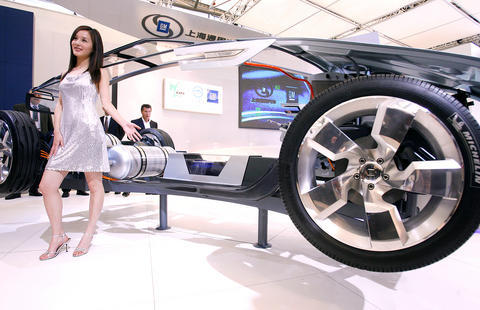Chinese automakers, under pressure from the government to produce more fuel-efficient cars, unveiled an unexpectedly broad array of prototypes for fuel-cell cars, gasoline-electric hybrid cars and electric-battery cars at the Shanghai auto show on Friday.
The variety and sophistication of the cars showed a striking improvement not just since the last Shanghai auto show two years ago, when Chinese automakers demonstrated scant technological innovation, but even in the months since the Beijing auto show last November.
Universities and technical institutes across China have started advanced vehicle propulsion research programs, combining strong government financial backing with China's rapidly growing ranks of skilled engineers.

PHOTO: AP
China, worried about severe air pollution and rising dependence on imported oil, has already imposed more stringent fuel economy standards than the US -- although not quite as stringent as the semi-voluntary standards that automakers have accepted in the EU.
China plans to tighten its standards considerably more next year. It has raised its consumption tax to as much as 20 percent on gas guzzlers, while cutting it to 1 percent for cars with small fuel-sipping engines. And China is studying whether to introduce tax incentives for buyers of hybrids.
Multinational automakers like General Motors and Volkswagen have begun cooperating closely with Chinese joint venture partners on the development of hybrid gasoline-electric vehicles. Larry Burns, GM's vice president for research and development, said the company was in talks with a Chinese joint venture partner on sharing hydrogen fuel-cell technology as well.
Xu Liuping (徐留平), the chief executive of Changan Automobile (長安汽車) in Chongqing, said the Chinese auto industry was working with the government to improve the country's energy security through more energy-efficient designs.
"The speed will be accelerated because available energy supplies are dwindling and because of the environmental protection aspect," Xu said in an interview at the Shanghai auto show.
Changan showed a hybrid gasoline-electric minivan here. Xu said that he had lined up local governments that promised to use it, making it possible for Changan to start manufacturing the vehicle next year.
Rick Wagoner, GM's chairman and chief executive, and Nick Reilly, the president of GM's Asian and Pacific regional operations, met on Thursday with senior Chinese officials in Beijing to discuss the company's energy efficiency plans, Reilly said. The Chinese government has not chosen among options like electric battery cars, fuel cells, hybrids and ethanol combustion, but wants the industry to move quickly to find the best approach and adopt it.
"It's absolutely at the top of the agenda" of the Chinese leadership, Reilly said.
Western environmentalists have long speculated whether China may actually leapfrog the West in personal transportation by embracing new automotive technologies before the country's oil and auto industries can become too wedded to internal combustion engines.
The odds of such a leapfrogging have eroded because nobody has yet surmounted the technological obstacles that prevent a broad switch from gasoline technology to hydrogen fuel cells, said An Feng, the executive director of the Innovation Center for Energy and Transportation in Beijing.
Shanghai Automotive Industry Corp (

Vincent Wei led fellow Singaporean farmers around an empty Malaysian plot, laying out plans for a greenhouse and rows of leafy vegetables. What he pitched was not just space for crops, but a lifeline for growers struggling to make ends meet in a city-state with high prices and little vacant land. The future agriculture hub is part of a joint special economic zone launched last year by the two neighbors, expected to cost US$123 million and produce 10,000 tonnes of fresh produce annually. It is attracting Singaporean farmers with promises of cheaper land, labor and energy just over the border.

US actor Matthew McConaughey has filed recordings of his image and voice with US patent authorities to protect them from unauthorized usage by artificial intelligence (AI) platforms, a representative said earlier this week. Several video clips and audio recordings were registered by the commercial arm of the Just Keep Livin’ Foundation, a non-profit created by the Oscar-winning actor and his wife, Camila, according to the US Patent and Trademark Office database. Many artists are increasingly concerned about the uncontrolled use of their image via generative AI since the rollout of ChatGPT and other AI-powered tools. Several US states have adopted

A proposed billionaires’ tax in California has ignited a political uproar in Silicon Valley, with tech titans threatening to leave the state while California Governor Gavin Newsom of the Democratic Party maneuvers to defeat a levy that he fears would lead to an exodus of wealth. A technology mecca, California has more billionaires than any other US state — a few hundred, by some estimates. About half its personal income tax revenue, a financial backbone in the nearly US$350 billion budget, comes from the top 1 percent of earners. A large healthcare union is attempting to place a proposal before

KEEPING UP: The acquisition of a cleanroom in Taiwan would enable Micron to increase production in a market where demand continues to outpace supply, a Micron official said Micron Technology Inc has signed a letter of intent to buy a fabrication site in Taiwan from Powerchip Semiconductor Manufacturing Corp (力積電) for US$1.8 billion to expand its production of memory chips. Micron would take control of the P5 site in Miaoli County’s Tongluo Township (銅鑼) and plans to ramp up DRAM production in phases after the transaction closes in the second quarter, the company said in a statement on Saturday. The acquisition includes an existing 12 inch fab cleanroom of 27,871m2 and would further position Micron to address growing global demand for memory solutions, the company said. Micron expects the transaction to